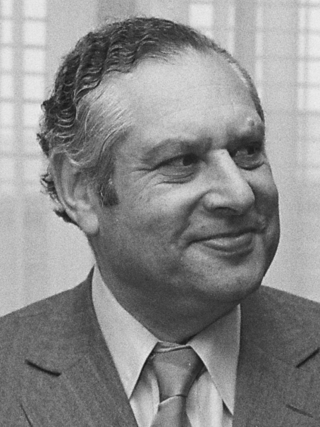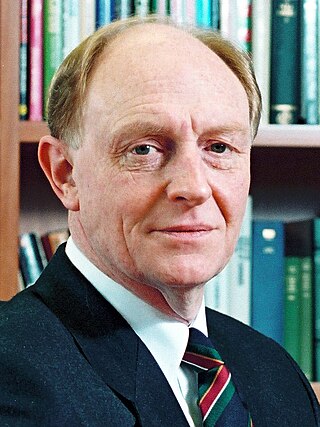Related Research Articles

John Ernest Silkin was a British left-wing Labour politician and solicitor.
Elections to the Labour Party's Shadow Cabinet took place in July 1992. Shadow Cabinet elections generally take place at the beginning of a parliamentary session, but the 1992 vote was postponed until a new leader was elected to replace Neil Kinnock. Under the rules then in effect, the Commons members of the Parliamentary Labour Party elected 18 members of the Official Opposition Shadow Cabinet, who were then assigned portfolios by the leader. The Commons members of the PLP separately elected the Chief Whip, and the Labour peers elected the Leader of the Opposition in the House of Lords. In addition, the Leader of the Labour Party and Deputy Leader were members by virtue of those offices. The 18 elected members of the Shadow Cabinet were the ones with the largest number of votes, except that the three women with the most votes would be included in the 18, even if they were not among the top 18 based on the number of votes.
Elections to the Labour Party's Shadow Cabinet took place in October 1993, at the beginning of the 1993/1994 session of parliament. Under the rules then in effect, the Commons members of the Parliamentary Labour Party elected 18 members of the Official Opposition Shadow Cabinet, who were then assigned portfolios by the leader. The Commons members of the PLP separately elected the Chief Whip, and the Labour peers elected the Leader of the Opposition in the House of Lords. In addition, the Leader of the Labour Party and Deputy Leader were members by virtue of those offices. The 18 elected members of the Shadow Cabinet were the ones with the largest number of votes. Beginning with this election, MPs were required to vote for at least four women, but women were no longer guaranteed three places in the Shadow Cabinet.

Neil Kinnock was Leader of the Labour Party and Leader of the Opposition from 2 October 1983 to 18 July 1992. He convincingly defeated Roy Hattersley, Eric Heffer, and Peter Shore in the 1983 leadership election, which was prompted by Michael Foot's resignation following the disastrous general election result earlier that year. Kinnock's period as Leader encompassed the bulk of the Thatcher premiership and the first two years of the Major premiership. Kinnock resigned in 1992 after losing his second election as Leader.

Michael Foot was Leader of the Opposition from 4 November 1980, following his victory in the 1980 leadership election, to 2 October 1983, when he was replaced by Neil Kinnock at the 1983 leadership election. The 1980 leadership contest was triggered by James Callaghan's loss at the 1979 general election, and the 1983 contest by Foot's own disastrous defeat in the 1983 general election.
Elections to the Labour Party's Shadow Cabinet occurred on 14 June 1979, following the Party's fall from power at the May general election that year. In addition to the 12 members elected, the Leader, Deputy Leader, Labour Chief Whip, Labour Leader in the House of Lords, and Chairman of the Parliamentary Labour Party were automatically members.
Elections to the Labour Party's Shadow Cabinet took place on 4 December 1980, having been delayed due to the October election of new Party Leader Michael Foot. In addition to the 12 members elected, the Leader (Foot), Deputy Leader, Labour Chief Whip, Labour Leader in the House of Lords, and Chairman of the Parliamentary Labour Party were automatically members.
Elections to the Labour Party's Shadow Cabinet took place on 19 November 1981. There were 15 posts, rather than 12 as in previous years. In addition to the 15 members elected, the Leader, Deputy Leader, Labour Chief Whip, Labour Leader in the House of Lords, and Chairman of the Parliamentary Labour Party were automatically members.
The annual election to the Labour Party's Shadow Cabinet was conducted in 1987. In addition to the 16 members elected, the Leader, Deputy Leader, Labour Chief Whip, Labour Leader in the House of Lords, and Chairman of the Parliamentary Labour Party were automatically members.
Elections to the Labour Party's Shadow Cabinet took place on 23 October 1991. Under the rules then in effect, the Commons members of the Parliamentary Labour Party elected 18 members of the Official Opposition Shadow Cabinet, who were then assigned portfolios by the leader. The Commons members of the PLP separately elected the Chief Whip, and the Labour peers elected the Leader of the Opposition in the House of Lords. In addition, the Leader of the Labour Party and Deputy Leader were members by virtue of those offices.
Elections to the Labour Party's Shadow Cabinet occurred in November 1958. In addition to the 12 members elected, the Leader, Deputy Leader, Labour Chief Whip, Labour Leader in the House of Lords, and Labour Chief Whip in the House of Lords were automatically members.
Elections to the Labour Party's Shadow Cabinet occurred in November 1956. In addition to the 12 members elected, the Leader, Deputy Leader, Labour Chief Whip, Labour Leader in the House of Lords were automatically members.
Elections to the Labour Party's Shadow Cabinet occurred in November 1959. In addition to the 12 members elected, the Leader, Deputy Leader, Labour Chief Whip, Labour Leader in the House of Lords, and Labour Chief Whip in the House of Lords were automatically members.
Elections to the Labour Party's Shadow Cabinet occurred in November 1989. For these elections the Shadow Cabinet was expanded from 15 to 18 seats and, for the first time, MPs had to cast at least three votes for women.
Elections to the Labour Party's Shadow Cabinet occurred in November 1973. In addition to the 12 members elected, the Leader, Deputy Leader, Labour Chief Whip, Chairman of the Parliamentary Labour Party, Labour Leader in the House of Lords, and Labour Chief Whip in the Lords were automatically members. The Labour Lords elected one further member, Baron Champion.
Elections to the Labour Party's Shadow Cabinet occurred in December 1971. In addition to the 12 members elected, the Leader, Deputy Leader, Labour Chief Whip, Chairman of the Parliamentary Labour Party, Labour Leader in the House of Lords, and Labour Chief Whip in the Lords were automatically members. The Labour Lords elected one further member, Baron Champion.
Elections to the Labour Party's Shadow Cabinet occurred in July 1970, following the party's defeat in the 1970 general election.
Elections to the Labour Party's Shadow Cabinet occurred in November 1963. In addition to the 12 members elected, the Leader, Deputy Leader, Labour Chief Whip, Labour Leader in the House of Lords, and Labour Chief Whip in the House of Lords were automatically members.
Elections to the Labour Party's Shadow Cabinet occurred in November 1962. In addition to the 12 members elected, the Leader, Deputy Leader, Labour Chief Whip, Labour Leader in the House of Lords, and Labour Chief Whip in the House of Lords were automatically members. The election saw no changes to the Shadow Cabinet.
Elections to the Labour Party's Shadow Cabinet occurred in November 1961. In addition to the 12 members elected, the Leader, Deputy Leader, Labour Chief Whip, Labour Leader in the House of Lords, and Labour Chief Whip in the House of Lords were automatically members. The election saw no changes to the Shadow Cabinet.
